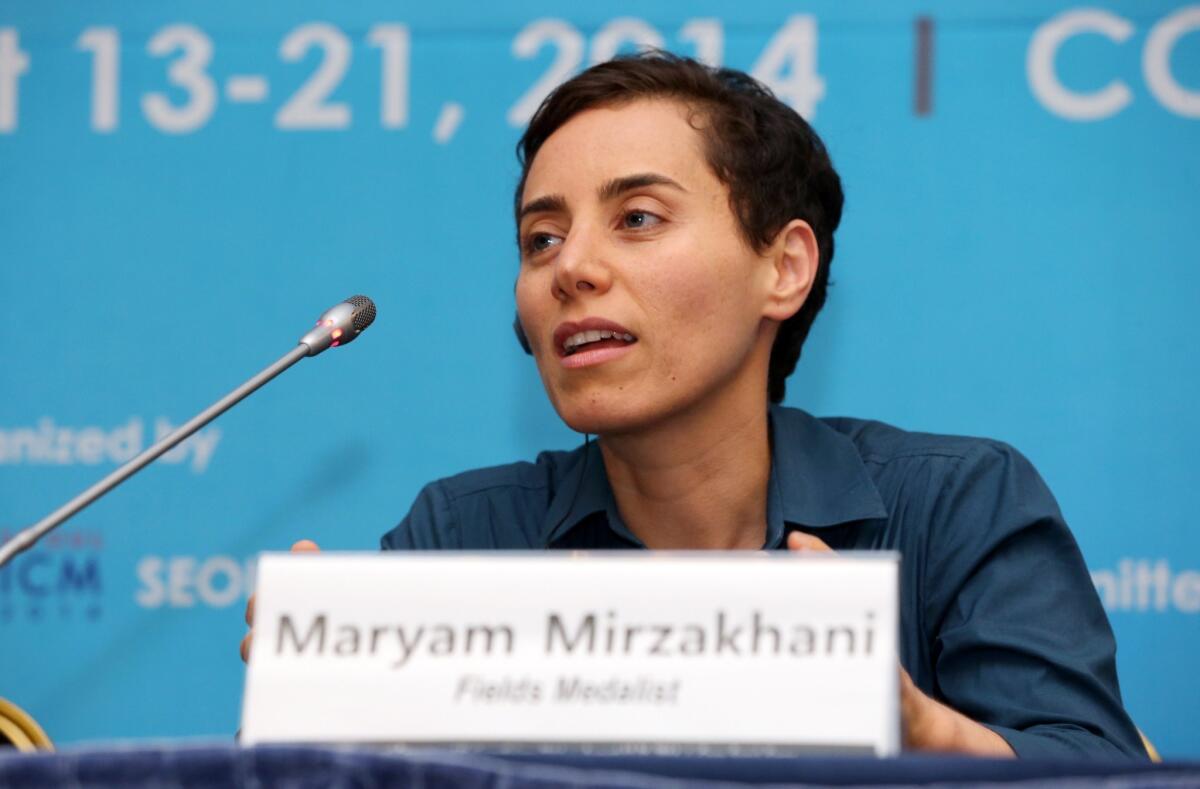Op-Ed: Solve this math problem: The gender gap

- Share via
Earlier this month, Maryam Mirzakhani became the first woman in history to win a Fields Medal — “math’s Nobel Prize.” This is a cause for celebration, but also for reflection.
Things are definitely better than they once were for women in mathematics. In the late 18th century, Sophie Germain, who made significant contributions to number theory despite having no formal schooling, had to use a male pseudonym initially to get the attention of renowned scholars Joseph-Louis Lagrange and Carl Friedrich Gauss, who later mentored her.
Sonia Kovalevsky, a 19th century Russian mathematician now known for her work in mathematical analysis, was only allowed to audit university courses because she was a woman. Ultimately, she earned her doctorate through the private tutoring of a mentor who recognized her talent.
And in the early 20th century, German universities initially refused to hire Emmy Noether because of her gender, even though Albert Einstein spoke on her behalf. As a result, she lectured for several years, unpaid and untitled, while doing the research in symmetry and abstract algebra for which she is still known.
Women may not face such blatant impediments to doing math and science today. But Mirzakhani’s achievement aside, we are still a long way from adequately recognizing the outstanding work of women.
Data gathered by the Assn. of Women in Science in 2010 show that women in the sciences and mathematics do not win peer recognition at a rate commensurate with their numbers in the profession. For instance, in 2010, women made up 24% of all tenure-track mathematics faculty at colleges and universities, but in the decade from 2001 through 2010, they won just 8.7% of the research and writing awards from the three major mathematical societies.
The disparity is similar across other sciences. In more than a century of Nobel Prizes in chemistry and physics, for example, only six have gone to women (and two of those were to Marie Curie).
What explains the disparity? One pernicious theory is that women are less capable of performing at the highest levels in math and science. But there are simply no data to support this belief.
For instance, one way to identify profound mathematical ability (though certainly not the only way) is to look at high school students who have won international math competitions. That group (which includes Mirzakhani) has few girls. But an in-depth study by researchers at the University of Texas and elsewhere suggested that socio-cultural factors washed out any other potential explanations for the gender gap.
Moreover, girls are succeeding at the highest levels in math at far higher rates today than in previous generations, suggesting there is nothing intrinsically nonmathematical about being female.
And girls raised in cultures with strong traditions in problem-solving competitions do much better in mathematics competitions than girls from cultures without such traditions. In the USA Math Olympiad, almost all of the girls who have won have been foreign-born, Asian American or home schooled — groups that place a high emphasis on mathematics.
Other theories for the low rates of women winning recognition in the sciences include that they put less time into their scholarship than men, because they are more likely to prioritize family. Or that award restrictions adversely limit opportunities for women (the Fields Medal, for example, has an age limit of 40). Or that women aren’t publishing enough. These pipeline issues should be studied and addressed. A likely contributing factor may be implicit bias: unconscious, unintentional judgments, research has shown, can lead employers to prefer a man over woman even when their applications are identical.
Because scientists have traditionally been male, men are more likely to fit into preconceived notions of what a scientist is. Research has shown that implicit bias can be mitigated, however, through such sound practices as appointing diverse hiring committees, having individual committee members make a list of top candidates before hearing the recommendations of other members and taking adequate time to make a decision. Such practices are sensible even when people don’t believe that bias exists.
When it comes to awards, no one would argue that they should go to the undeserving. But for most kinds of recognition, there are many more deserving candidates than there are awards to confer. As an example, I recently won a national teaching award. Does that mean I am truly the best math professor in the nation? Of course not. In most cases, award winners are simply representatives who exemplify the achievement of many deserving candidates.
Still, winners are seen as role models, so it matters who wins.
Mirzakhani will now inspire many young girls in mathematics. This year’s Fields medalists also included Artur Avila, the first recipient from Latin America, and Manjul Bhargava, the first of Indian descent. Such recognition is an especially promising development for the future, because a healthy diversity of deserving winners represents a community’s visible commitment to encouraging its least visible members, who may one day do great things.
As Carl Friedrich Gauss once wrote to his mentee Sophie Germain about her mathematical abilities, “When a woman, because of her sex, our customs and prejudices, encounters infinitely more obstacles than men … yet overcomes these fetters and penetrates that which is most hidden, she doubtless has the most noble courage, extraordinary talent, and superior genius.”
But no one should be required to have “the most noble courage” in order for their work to be recognized. In every corner of humanity, we must nurture that talent, or else our nation and world may overlook those whose discoveries could benefit and inspire us all.
Francis Su is the Benediktsson-Karwa professor of mathematics at Harvey Mudd College and president-elect of the Mathematical Assn. of America.
Follow the Opinion section on Twitter @latimesopinion
More to Read
A cure for the common opinion
Get thought-provoking perspectives with our weekly newsletter.
You may occasionally receive promotional content from the Los Angeles Times.










